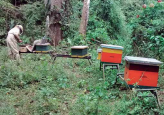Beekeeping as an environmental factor
Abstract
Beekeeping is one of the few areas of agriculture that is truly conservationist, not only because its practice is minimally deforested, but also because of the unit of visible product generated (pollen, honey, royal jelly, propolis, wax and apitoxin), the CO2 content produced is very low, when compared to other items. Additionally, it does not use agrochemicals or its use is minimal (at least in tropical beekeeping) and the residues generated are not polluting to the environment. However, the true contribution of bees to the environment comes from pollination, a service that is provided free of charge, which allows the perpetuation of plant species by avoiding genetic erosion and improving the production rates of crops.
References
Manrique, A. y J. Blanco. 2013. Polinización de tomate, calabacín y pepino, con Meliponinos y Apis mellifera en invernaderos. Zootecnia Tropical. 31(3), 243-254 pp.


